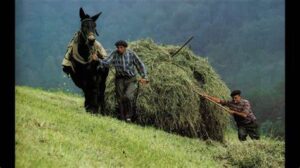 The French word paysanne does not really have an English equivalent, peasant is the literal translation. But in English peasant carries with it a belittling, a sort of mixture of backwardness, and animal cunning, with untrustworthiness and stupidity wrapped up in one. Calling someone a peasant in English is not a compliment, rather the inverse.
The French word paysanne does not really have an English equivalent, peasant is the literal translation. But in English peasant carries with it a belittling, a sort of mixture of backwardness, and animal cunning, with untrustworthiness and stupidity wrapped up in one. Calling someone a peasant in English is not a compliment, rather the inverse.
Not a all the sense that the French word carries.
Looking for a better translation I first looked at yeoman, a medieval word that encompasses an independent property owner. A yeoman had a social ranking below that of the gentry, but close ties to the gentry, most often in service to the gentry in one form or another, Yeoman of the Guard, Naval yeoman, indeed one granted the vote in the early 15th century from owning over 40 shillings worth of land. A yeoman had a voice, and indeed formed the backbone of the medieval miliary and civil power. Maybe a little high powered to capture the sense of the word paysanne.
Researching the meaning of yeoman led me to another type,of English rural land worker the husbandman. That is husband in the sense of “Head of the Household” rather than the sense of a married man.
The anthropologist Charles Stanley Patridge described the husbandman as in England “Husbandman is a term denoting not rank but occupation… Knights, esquires, gentlemen and yeomen were also husbandmen if occupied in agriculture, but were never styled husbandmen because of their right to be styled knights, etc. The agriculturist who had no right to be styled knight or esquire or gentleman, and who, not being a forty-shilling freeholder was not a yeoman, was described as husbandman.“
Wikipedia define the roots of the word husbandman as “The term husband refers to Middle English huseband, from Old English hūsbōnda, from Old Norse hūsbōndi (hūs, “house” + bōndi, būandi, present participle of būa, “to dwell”, so, etymologically, “a householder”). The origin is the verb ‘to husband’ which originally meant ‘till’ or ‘cultivate’. “
This definition more closely fits the word paysanne, a rural landworker who owns or controls, through renting, a small holding that they work for a living. .
Better suggestion welcome.

